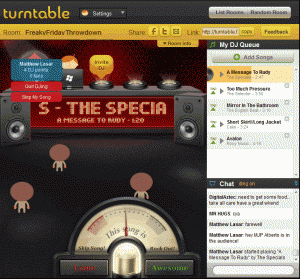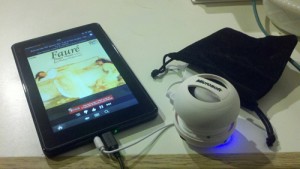2011 was supposed to be the Pandora Takeoff Moment—the year that Pandora went public and solidified its absolute, total dominance over Internet radio and music streaming. And coming out of the starting gate in February, it sure looked like that was going to happen. Pandora’s S-1 form noted that it had registered 80 million users as of January 2011, with a new one signing up every second.
Plus, Pandora had cornered around half of all Internet radio listening among the top 20 online stations and networks in the United States, according to one survey. “Since we launched the Pandora service in 2005, our listeners have created over 1.4 billion stations,” the S-1 statement added.
But by the third quarter of this year, it was clear that while Pandora remains King of cyber-radio—like Louis the XVI, its reign has yet to reach financial sustainability. Royalty costs, the fragmented mobile listening market, and, gasp, competition from broadcast radio for advertisers has forced the company to spend more cash on product development, marketing and sales. Some of that competition is coming from Clear Channel, with its upgraded version of iHeartRadio.
“We expect that this increased level of operating expenses will continue into the future,” Pandora’s S-3 statement disclosed. “As a result of the foregoing factors, we expect to continue to incur operating losses on an annual basis through at least the end of fiscal 2012.”
Meanwhile, something else was happening too: a plethora of music social networking startups, exports, experiments, and rebels popped up all over cyberspace, or reinvented themselves. These outliers are redefining not only online music sharing, but “radio” itself. Here is an admittedly ramshackle assessment of some of the most interesting players.
Turntable.fm
 Turntable.fm surfaced in May of this year, and it quickly took Internet radio by storm. You can access the site via your Facebook or Twitter account. “TT.fm”—as its fans call it, allows users to create rooms and share tunes via the service’s database. Or subscribers can upload music themselves. Once established, you get points from other listeners who “awesome” your picks. They can also list themselves as one of your fans.
Turntable.fm surfaced in May of this year, and it quickly took Internet radio by storm. You can access the site via your Facebook or Twitter account. “TT.fm”—as its fans call it, allows users to create rooms and share tunes via the service’s database. Or subscribers can upload music themselves. Once established, you get points from other listeners who “awesome” your picks. They can also list themselves as one of your fans.
Over the last six months, a veritable universe of Turntable.fm stars have emerged, the most noted of them being DJ Wooooo, the “#1 Deejay on Turntable.fm,” as his Twitter page explains. He has no less than 7,065 fans, according to the ttdashboard. But he also has plenty of competition. An uncountable number of full and semi-entrepreneurs are now running all kinds of music events on these rooms, from “Mashtivals” to “Party Bus” frolicks.
From May through September, tt.fm enjoyed a huge wave of adulation and buzz. Then its participation numbers dropped, to the apparent delight of skeptics. But I continue to see turntable.fm as a real breakthough, a way for small groups of people to create online community radio stations that replicate the radio dj experience. The tt.fm story is just beginning, I suspect.
Soundtap and and RadioFlag
 Less well known but very much deserving of mention are Soundtap and RadioFlag. As Jennifer Waits points out, RadioFlag’s search mechanisms have become a bit hit with the college radio loving crowd. And that goes quadruple for Soundtap, the “human-powered” and “crowd sourced guide to independent radio” that allows you to aggregate your favorite community and college radio shows.
Less well known but very much deserving of mention are Soundtap and RadioFlag. As Jennifer Waits points out, RadioFlag’s search mechanisms have become a bit hit with the college radio loving crowd. And that goes quadruple for Soundtap, the “human-powered” and “crowd sourced guide to independent radio” that allows you to aggregate your favorite community and college radio shows.
“While investigating the site today, I spotted shows from some of my favorite DJs at KALX , KZSU, KUSF in Exile, and WFMU,” Jennifer noted in her review of Soundtap. “I was also able to add some programs from my own station, KFJC . The interface allows you to add not only descriptions of radio shows, but also links to their Facebook pages, Twitter URLs, and playlists.”
Spotify
 Some experts think that Spotify’s migration from the United Kingdom to the United States may have taken some of the steam out of tt.fm. As Radio Survivor’s Paul Riismandel notes, Spotify’s “killer feature” is that it allows you to share a full playlist with other users:
Some experts think that Spotify’s migration from the United Kingdom to the United States may have taken some of the steam out of tt.fm. As Radio Survivor’s Paul Riismandel notes, Spotify’s “killer feature” is that it allows you to share a full playlist with other users:
because it most closely emulates the experience of a mix tape, as easy to assemble as making an iTunes playlist. Certainly there are other ways to share a playlist of tunes online, but most require you to either just share the list of songs which the other person would have to assemble herself. Otherwise you have to upload the song files yourself, which is something that exists in a legal grey area, at least in the US.
On the other hand, Paul didn’t think that Spotify scratched “the radio itch.”
A jukebox is not the same thing as a radio station. For me the radio music experience is marked by a combination of predictability and surprise. I know the genre of the stations or the specific show, but I don’t know what song will come next; often it will be something I’ve never heard before. Both Pandora and last.fm provide something much closer to that radio experience, combined with a level of control that lets you filter out sounds you don’t want to hear.
A host of Spotify-like services have also appeared on the horizon, most notably Rdio and Myxer Social Radio, the latter which our reviewer Eddy Vien describes as “a hybrid between Pandora and Turntable.fm.” But I tend to agree with Paul’s radio-versus-jukebox observation. Spotify is a breakthough in sharing, but not necessarily one of the radio kind.
2012 and beyond
With various online radio friendly tablets hitting the market, all sorts of turntabling and sharing applications are coming out now. We’re still looking for reviewers for loDj.org, which allows you to “watch local music,” Songza (“expert made playlists for everything”), and Black Planet Radio, which is part of “Black Planet” (“Join the largest Black Community online!”).
There are probably a dozen other apps that have escaped our attention, but what didn’t miss our gaze is the advertising deal that Clear Channel has made with Cumulus. The latter’s 570 stations will be featured on iHeartRadio, and the former will have access to Cumulus’ Sweetjack.com: “the rapidly growing deals platform that provides local merchants—including the best restaurants, spas, salons, stores and venues—the promotional power of radio.”
Everybody is getting into the social networking biz now. The process is slowly but surely creating an authentic online radio experience and redefining conventional radio as well (especially with widely used song searchable apps like TuneIn radio). It would help if the economy picked up, but it says worlds about the level of creativity out there that so much innovation is happening right now in such dire times.




